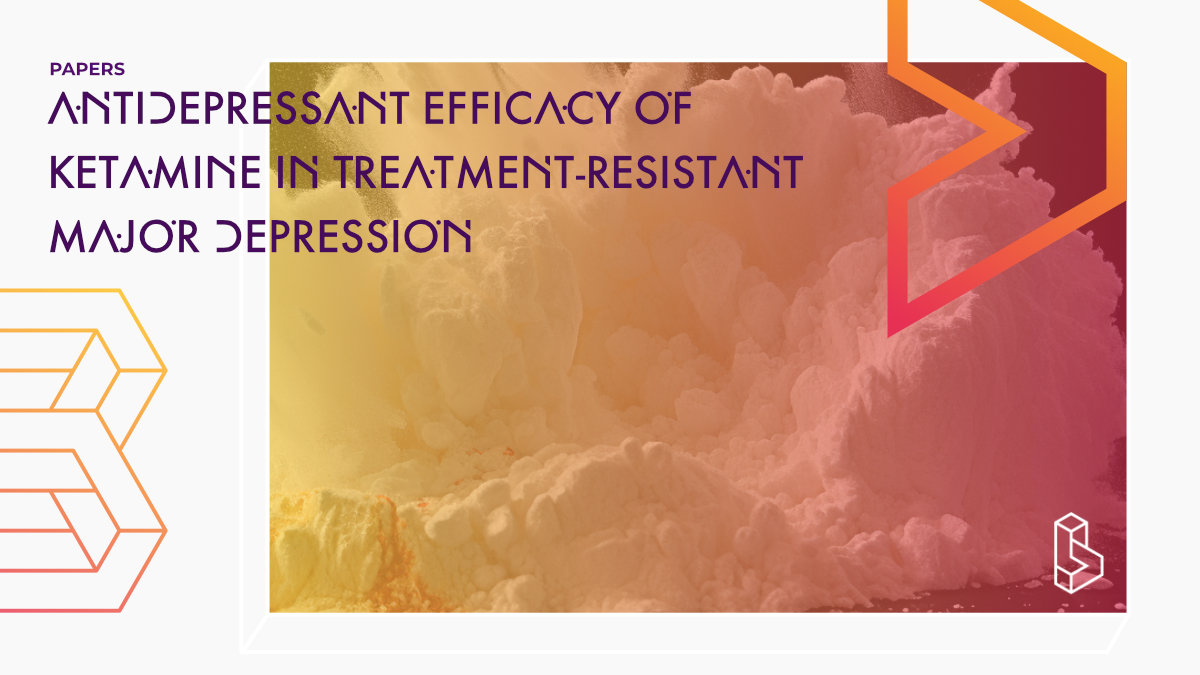This rigorous randomized controlled trial (n=73) found that ketamine has rapid (24 hours) anti-depressant effects (MARDS) for those with treatment-resistant depression (TRD). Compared to the placebo group (midazolam), ketamine led to greater improvements in MADRS scores by 7.95 points, and the response rate was greater in the ketamine group.
Abstract of Antidepressant Efficacy of Ketamine in Treatment-Resistant Major Depression
“Objective: Ketamine, a glutamate N-methyl-D-aspartate (NMDA) receptor antagonist, has shown rapid antidepressant effects, but small study groups and inadequate control conditions in prior studies have precluded a definitive conclusion. The authors evaluated the rapid antidepressant efficacy of ketamine in a large group of patients with treatment-resistant major depression.
Method: This was a two-site, parallel-arm, randomized controlled trial of a single infusion of ketamine compared to an active placebo control condition, the anaesthetic midazolam. Patients with treatment-resistant major depression experiencing a major depressive episode were randomly assigned under double-blind conditions to receive a single intravenous infusion of ketamine or midazolam in a 2:1 ratio (N=73). The primary outcome was a change in depression severity 24 hours after drug administration, as assessed by the Montgomery-Åsberg Depression Rating Scale (MADRS).
Results: The ketamine group had greater improvement in the MADRS score than the midazolam group 24 hours after treatment. After adjustment for baseline scores and site, the MADRS score was lower in the ketamine group than in the midazolam group by 7.95 points (95% confidence interval [CI], 3.20 to 12.71). The likelihood of response at 24 hours was greater with ketamine than with midazolam (odds ratio, 2.18; 95% CI, 1.21 to 4.14), with response rates of 64% and 28%, respectively.
Conclusions: Ketamine demonstrated rapid antidepressant effects in an optimized study design, further supporting NMDA receptor modulation as a novel mechanism for accelerated improvement in severe and chronic forms of depression. More information on response durability and safety is required before implementation in clinical practice.”
Authors: James W. Murrough, Dan V. Iosifescu, Lee C. Chang, Rayan K. Al Jurdi, Charles M. Green, Andrew M. Perez, Syed Iqbal, Sarah Pillemer, Alexandra Foulkes, Asim Shah, Dennis S. Charney & Sanjay J. Mathew
Summary of Antidepressant Efficacy of Ketamine in Treatment-Resistant Major Depression
Major depressive disorder is among the most disabling illnesses worldwide, and treatment-resistant major depression is associated with low improvement rates with currently available antidepressant treatments. Novel molecular targets outside of the monoamine system are thus required for clinically meaningful advances in depression therapeutics.
In vivo brain imaging studies, postmortem investigations, and gene expression studies implicate abnormalities in glutamatergic signalling in the pathophysiology of major depressive disorder. Ketamine, a glutamate N-methyl-d-aspartate (NMDA) receptor antagonist, has been associated with rapid antidepressant effects in patients with major depressive disorder.
The authors tested the rapid antidepressant efficacy of ketamine in a relatively large group of subjects with treatment-resistant major depression. Ketamine was found to be superior to midazolam in improving depressive symptoms 24 hours following a single infusion.
Find this paper
https://doi.org/10.1176/appi.ajp.2013.13030392
Open Access | Google Scholar | Backup | 🕊
Cite this paper (APA)
Murrough, J. W., Iosifescu, D. V., Chang, L. C., Al Jurdi, R. K., Green, C. E., Perez, A. M., ... & Mathew, S. J. (2013). Antidepressant efficacy of ketamine in treatment-resistant major depression: a two-site randomized controlled trial. American Journal of Psychiatry, 170(10), 1134-1142.
Study details
Compounds studied
Ketamine
Topics studied
Depression
Study characteristics
Placebo-Controlled
Active Placebo
Double-Blind
Randomized
Participants
73
Humans
Compound Details
The psychedelics given at which dose and how many times
Ketamine 35 mg | 1x
